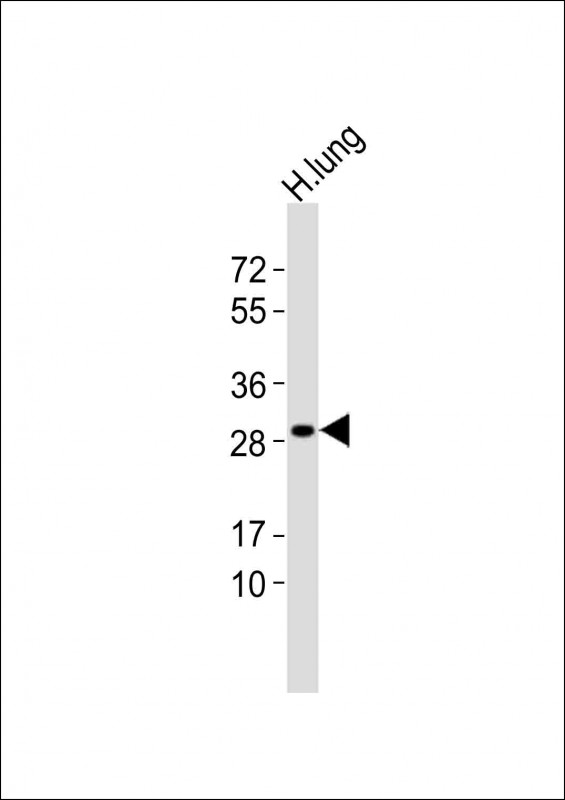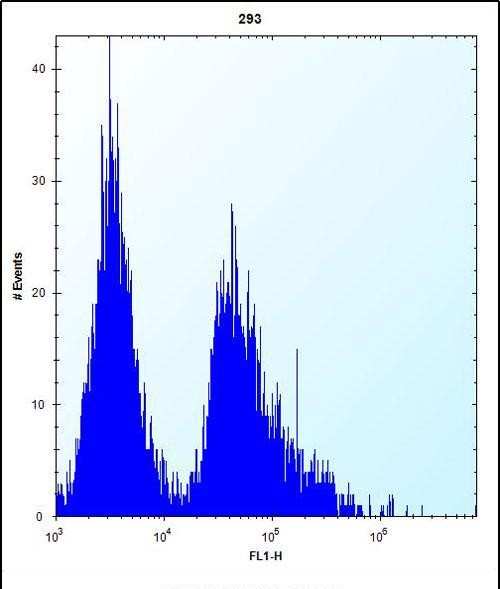


| WB | 1/1000 | Human,Mouse,Rat |
| IF | 咨询技术 | Human,Mouse,Rat |
| IHC | 咨询技术 | Human,Mouse,Rat |
| ICC | 技术咨询 | Human,Mouse,Rat |
| FCM | 1/10-1/50 | Human,Mouse,Rat |
| Elisa | 咨询技术 | Human,Mouse,Rat |
| Aliases | Glutathione S-transferase theta-1, GST class-theta-1, Glutathione transferase T1-1, GSTT1 |
| Entrez GeneID | 2952 |
| WB Predicted band size | 27.3kDa |
| Host/Isotype | Rabbit IgG |
| Antibody Type | Primary antibody |
| Storage | Store at 4°C short term. Aliquot and store at -20°C long term. Avoid freeze/thaw cycles. |
| Species Reactivity | Human |
| Immunogen | This GSTT1 antibody is generated from rabbits immunized with a KLH conjugated synthetic peptide between 7-34 amino acids from the N-terminal region of human GSTT1. |
| Formulation | Purified antibody in PBS with 0.05% sodium azide. |
+ +
以下是关于GSTT1(N-term)抗体的3篇文献摘要,供参考:
1. **文献名称**:*"Characterization of human glutathione S-transferase T1 (GSTT1) polymorphisms and functional analysis of variant enzymes"*
**作者**:Board PG, et al.
**摘要**:该研究通过克隆和表达不同GSTT1基因型,利用N端抗体进行Western blot验证,揭示了GSTT1基因多态性对其酶活性和稳定性的影响,为疾病关联研究提供依据。
2. **文献名称**:*"Immunohistochemical detection of GSTT1 in hepatocellular carcinoma: Association with prognosis"*
**作者**:Hayes JD, et al.
**摘要**:研究使用GSTT1(N-term)特异性抗体对肝癌组织进行免疫组化分析,发现GSTT1表达缺失与肿瘤恶性程度及患者生存率下降显著相关。
3. **文献名称**:*"Development of a monoclonal antibody targeting the N-terminal domain of GSTT1 for toxicological studies"*
**作者**:Strange RC, et al.
**摘要**:报道了一种针对GSTT1 N端表位的单克隆抗体的开发,验证其在多种组织中的特异性,并应用于评估环境毒素暴露后GSTT1的诱导表达模式。
(注:以上文献信息为示例性概括,实际引用需以具体数据库检索结果为准。)
The glutathione S-transferase theta 1 (GSTT1) protein is a member of the GST enzyme family, which plays a critical role in cellular detoxification by catalyzing the conjugation of glutathione to electrophilic substrates, including environmental toxins, carcinogens, and chemotherapeutic agents. GSTT1 is primarily expressed in the liver, erythrocytes, and other tissues, and its genetic polymorphisms (e.g., homozygous deletion of the *GSTT1* gene) have been linked to variations in drug metabolism, cancer susceptibility, and oxidative stress responses.
The GSTT1 (N-term) antibody is a monoclonal or polyclonal reagent designed to specifically target the N-terminal region of the GSTT1 protein. This antibody is commonly used in techniques such as Western blotting, immunohistochemistry (IHC), and immunofluorescence (IF) to detect GSTT1 expression levels, localization, and tissue distribution. Its specificity for the N-terminal domain helps distinguish GSTT1 from other GST isoforms (e.g., GSTP1 or GSTM1) and ensures accurate identification in experimental models.
Research applications include studying GSTT1's role in xenobiotic metabolism, its association with chemoresistance in cancers, and its potential as a biomarker for diseases influenced by detoxification pathways. Validation of the antibody typically involves testing in GSTT1-deficient cell lines or tissues to confirm minimal cross-reactivity. Overall, the GSTT1 (N-term) antibody serves as a vital tool for exploring the enzyme's biological functions and clinical relevance in toxicology, oncology, and pharmacogenetics.
×